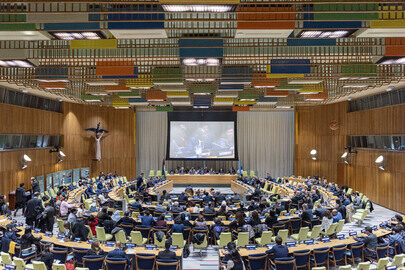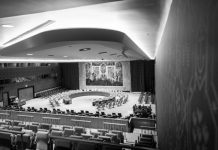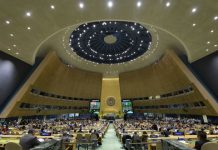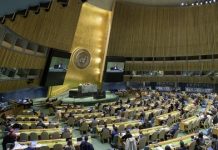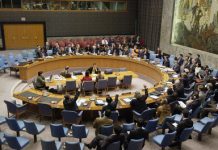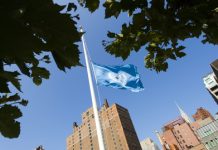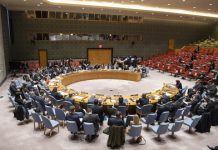Two of the country’s main specialist hospitals for children and women were heavily damaged along with key energy infrastructure, reportedly killing dozens of civilians, including children, and injuring over 110.
Joyce Msuya, acting UN Emergency Relief Coordinator, told ambassadors in the Security Council on Tuesday, that the UN human rights office (OHCHR) was verifying the figures, while rescue workers, hospital staff and volunteers continue to clear rubble in search of those trapped under debris.
“My heart goes out to all those affected,” she expressed, reiterating that hospitals have special protection under international humanitarian law.
“Intentionally directing attacks against a protected hospital is a war crime, and perpetrators must be held to account.”
‘Systematic attacks’
Ms. Msuya further noted that the recent incidents were part of a “deeply concerning pattern of systematic attacks” harming healthcare and other civilian infrastructure across Ukraine.
“Attacks have intensified since the spring of 2024,” she said.
As of 30 June, before the latest wave of missile strikes, OHCHR has verified 11,284 civilian deaths and 22,594 injured due to the conflict which began with Russia’s invasion of February 2022.
Furthermore, the UN World Health Organization (WHO) has verified 1,878 attacks affecting healthcare facilities, personnel, transport, supplies and patients.
Alongside the destruction of schools, homes and critical civilian infrastructure, “the consequences for the humanitarian situation in Ukraine are, of course, severe,” Ms. Msuya emphasized.
Humanitarian access
She highlighted that aid operations have been impacted by the attacks, with more than 14.6 million people – around 40 per cent of the Ukrainian population – requiring some form of humanitarian assistance.
She also voiced deep concern over humanitarian access to some 1.5 million people in Russian-occupied regions of Donetsk, Kherson, Luhansk and Zaporizhzhia.
“Like all others living close to the frontline in Ukraine, they undoubtedly require urgent access to healthcare and medicine, food, and clean drinking water. In accordance with international humanitarian law, it is imperative that impartial humanitarian relief be facilitated for all civilians in need,” Ms. Msuya said.
Resources needed
Ms. Msuya highlighted the need for more resources to keep humanitarian operations going.
“To sustain operations in an increasingly complex and dangerous environment, we urgently need donors to accelerate funding for the humanitarian response,” she said.
“All the more so as another winter approaches amid no sign of an easing of hostilities or their impact on civilians and civilian infrastructure.”
Joyce Msuya, acting Emergency Relief Coordinator, briefs the Security Council.
Doctor describes ‘real hell’ under fire
Volodymyr Zhovnir, a cardiac surgeon and anaesthesiologist at the children’s hospital, described the scene to the ambassadors when their facility in Kyiv was struck on Monday.
“At 10:42 AM we felt a powerful explosion, the ground shook and the walls trembled, both children and adults screamed and cried from fear and wounded from pain…it was a real hell,” he said via video link.
According to news reports, two died when part of the Ohmatdyt Children’s Hospital was hit.
He noted the serious long-term impact on Ukrainian children in need of medical care who are caught up in the fighting, alongside the long-term psychological impact.
Mr. Zhovnir underscored that striking children’s hospitals where they are treated for cancer and other deadly diseases “is not just a war crime, it is far beyond the limit of humanity”.
China: Do not fan the flames
China’s Ambassador and Deputy Permanent Representative Geng Shuang, noted the impact of the conflict which he said had triggered “a serious humanitarian crisis with huge spillover effects.”
“Instead of stopping, the fighting has intensified…which resulted in serious casualties,” he said.
“China is deeply concerned about it and we reiterate our call on the parties to the conflict to exercise rationality and restraint, effectively comply with international humanitarian law and do their utmost to avoid civilian casualties,” he added.
The priority should be to deescalate the situation, he said, by observing the three principles of “no expansion of the battlefield, no escalation of fighting, and no fanning by any party of the flames.”
United States: Attack on hospital, one of many
US Permanent Representative Linda Thomas-Greenfield told her fellow ambassadors they were gathered in emergency session for a single reason: “We are here today because Russia, Permanent Member of the Security Council, current rotational President of the Council, attacked a children’s hospital.”
“Even uttering that phrase sends a chill down my spine,” she added.
Highlighting the impact on civilians, including children, Ambassador Thomas-Greenfield said that the “brutal attack” was “hardly a standalone incident”, citing recent strikes against medical facilities.
“The fact is that across the country hundreds of children have been killed, thousands have been wounded and millions have been displaced from their homes as Russia continues its campaign of terror in Ukraine,” she said.
“And then there are those children that Russia has deported or forcibly transferred, robbing Ukrainian youth of not only their futures but their very identities,” she added.
Russia: West trying to protect Kyiv regime
Russian Ambassador and Permanent Representative Vassily Nebenzia, Council President for July, spoke in his national capacity.
He stated that it was clear from statements by Western colleagues that “the topic of the alleged Russian strike on the children’s hospital” which had let to the emergency meeting “is not a very gratifying topic.”
“They probably saw many analyses of what happened on photos and videos, from which it clearly follows that this was a missile of the Ukrainian air defence,” he said.
“Here you get the magic of verbal gymnastics demonstrated by Western members of the Security Council, trying by any means to protect the Kyiv regime,” he added.
Ambassador Nebenzia said that the “dishonesty of this tactic is clear to the naked eye as was noticed immediately by the Ukrainians themselves” through the video of the strike that appeared on the Internet.
He said the Ukrainian authorities had sought to divert attention away from the incident to “distract the masses from the daily lawlessness of the Government corruption”.
Ukraine: A deliberate target
Ukraine’s Ambassador Sergiy Kyslytsya said that on Monday Russia had “deliberately targeted” society’s most vulnerable and defenceless group – “children with cancer and other life-threatening illnesses”.
He noted that even in times of peace, these children face enormous challenges and suffering, and require a lot of support, treatment and care.
“Yesterday Russia again showed its repugnant version of empathy towards children by attacking the Ohmatdyt [hospital] with their KH-101 cruise missile,” he added.
He cited video footage that captured “the moment” the missile “dives towards” the hospital building, adding that remnants of the missile had been found amid the wreckage. Ukrainian police and security services are carrying out a full investigation, he told ambassadors.
“According to the preliminary assessment of military specialists, the specified objects belong to the parts and components of the KH-101 strategic air to ground cruise missile, which is in service of the Russian Army and used by long-range Russian aviation units,” he said.
Source of original article: United Nations (news.un.org). Photo credit: UN. The content of this article does not necessarily reflect the views or opinion of Global Diaspora News (www.globaldiasporanews.net).
To submit your press release: (https://www.globaldiasporanews.com/pr).
To advertise on Global Diaspora News: (www.globaldiasporanews.com/ads).
Sign up to Global Diaspora News newsletter (https://www.globaldiasporanews.com/newsletter/) to start receiving updates and opportunities directly in your email inbox for free.


